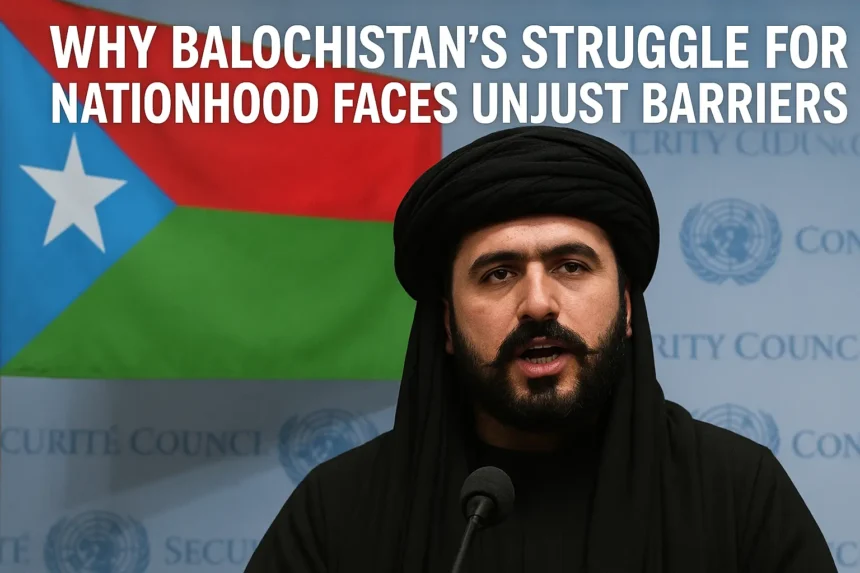Why Balochistan’s Struggle for Nationhood Faces Unjust Barriers
A Bold Breakaway That Shook the Region
Imagine a province that makes up 44% of its parent country—rising up, declaring freedom, and daring the world to recognize it. That’s exactly what Balochistan did.
The region, long plagued by alleged human rights abuses and political suppression, has now taken a dramatic step: it’s officially declared independence from Pakistan. But is declaring independence enough to become a new country?
Let’s break down the exact steps Balochistan must take, the global players involved, and the daunting road ahead in its quest to become the world’s newest nation.
1. Declaration Alone Isn’t Enough: The Fight for Recognition Begins
Recently, Balochistan’s top leader, Mir Yar, made a passionate appeal to the United Nations, calling for immediate recognition of Balochistan as an independent nation. He accused Pakistan of severe atrocities, including kidnappings and human rights violations, and requested global support, especially from India.
He even went so far as to ask for financial aid to print currency and issue passports and urged India to open an embassy in Balochistan. But as emotional and symbolic as these moves are—they are just the beginning.
2. Applying to the UN: The First Legal Step to Nationhood
So, how does a breakaway region like Balochistan actually become a recognized country?
The process begins by submitting an official request to the United Nations Secretary-General. But here’s the catch—before the request even reaches the broader UN General Assembly, it must be approved by the UN Security Council.
The Security Council has 15 member countries, and at least 9 of them must support the request. But that’s not all…
3. The Power of Veto: 5 Countries That Can Crush Balochistan’s Dreams
Among those 15 countries, five are permanent members with veto power:
- United States
- Russia
- China
- France
- United Kingdom
If even one of these countries votes against Balochistan’s recognition, the entire application is rejected—no matter how many other countries support it.
This poses a huge problem for Balochistan because China is a strong ally of Pakistan, and Russia has traditionally supported existing national sovereignties.
In short, geopolitics could destroy Balochistan’s dream before it even begins.
4. Even Recognition Doesn’t Guarantee Nationhood
Let’s assume, somehow, Balochistan manages to pass the Security Council hurdle. What’s next?
Then comes the UN General Assembly, where at least two-thirds of the 193 member nations must vote in favor of admitting Balochistan as a UN member state.
Only after this can Balochistan access:
- International loans (IMF, World Bank)
- Global diplomatic recognition
- Military alliances and treaties
- The ability to sign international agreements
Until this happens, Balochistan remains an unrecognized entity—similar to Taiwan, Kosovo, or Palestine, whose sovereignty is still disputed despite functioning governments.
5. Without Global Support, It’s Just a Dream
As of now, no major world power has officially recognized Balochistan’s declaration of independence.
Even if India expresses symbolic support, without broad global backing, including from Western and regional powers, Balochistan will find it nearly impossible to function as a nation.
The Pakistani government, naturally, has outright rejected the separation, calling it illegal and unconstitutional. Given that Balochistan holds huge mineral wealth, including gold, natural gas, and uranium, Pakistan is unlikely to let it go without a fight.
The Emotional Toll: A Cry for Freedom or a Political Gamble?
To supporters of independence, this is a fight for dignity, identity, and justice. To critics, it’s a geopolitical gamble that could lead to war, isolation, or even civil unrest.
Balochistan’s leaders are betting on international sympathy, strategic alliances, and media pressure to sway global opinion. But is that enough?
Final Thoughts: A Long Road, But Not Impossible
Why the World Must Support Balochistan’s Fight for Freedom
Balochistan’s struggle for recognition is rooted in decades of pain, resistance, and a longing for freedom. The people have endured oppression, human rights abuses, and systemic neglect. Their call for independence is not just political—it’s deeply human. If nations truly believe in democracy, justice, and human dignity, they must listen to Balochistan’s voice. Supporting Balochistan means standing up for the oppressed and recognizing their right to self-determination. The world must not ignore their rightful demand for freedom.
Most read: https://tnheadlines24.com/pakistan-heads-unsc-in-july-2025/
Also read: https://tnheadlines24.com/why-turkiye-wants-to-replace-china/
Are you following the Balochistan movement? Do you believe it deserves independence?
Share your thoughts in the comments and subscribe to our newsletter for updates on global conflicts, independence movements, and geopolitical analysis.
Disclaimer: The views and claims presented in this article are based on publicly available information and reports. TN HEADLINES24 does not confirm or endorse any political stance or separatist movement. TN HEADLINES24 is not responsible for the accuracy of statements made by third parties or the consequences of actions taken based on this content.

